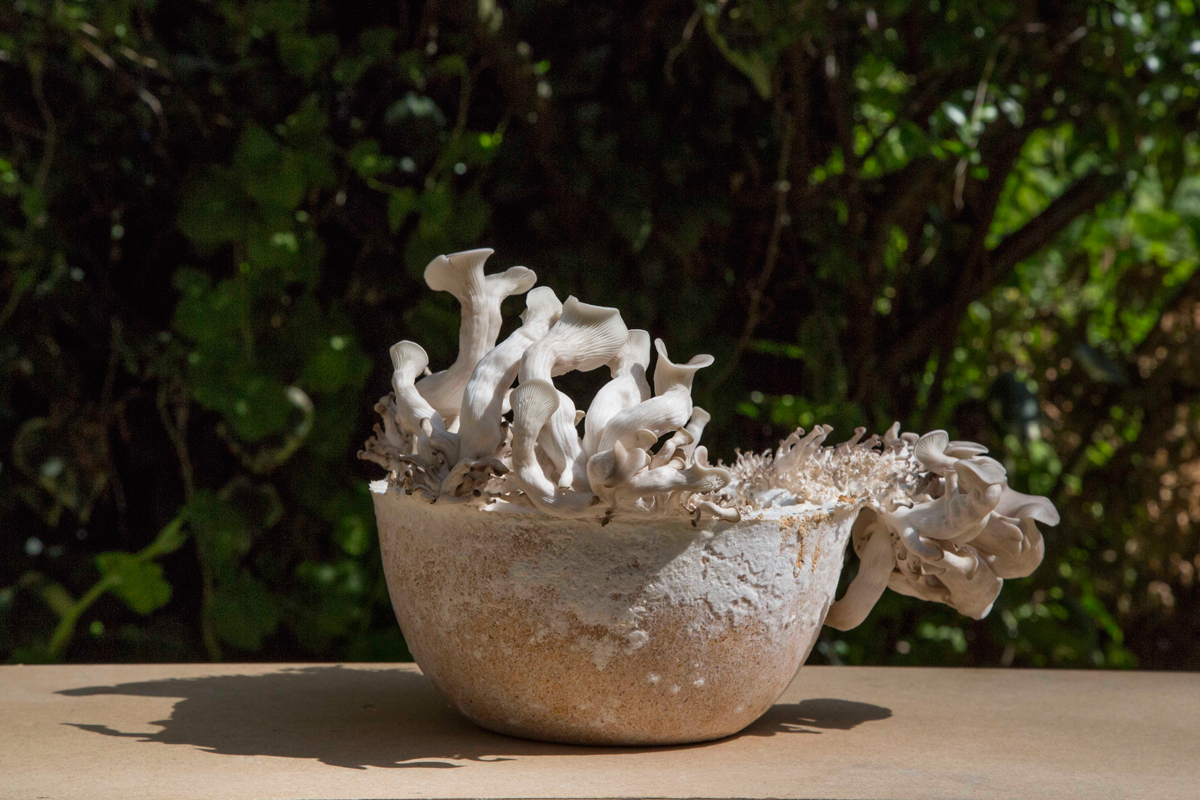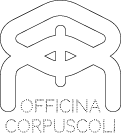WORDS PURE MYCELIUM OBJECTS

The Growing Lab / Mycelia is an artistic research project investigating and reflecting upon possibilities for the establishment of active relations and thorough cooperation between human and non-human agents (i.e. fungal microorganisms).
One of the main challenges of the current century is to transform our consumption-oriented economic system into an eco-friendly and self-sustaining society, capable of minimising energy consumption, carbon emissions and the production of waste, while reducing production costs.
The Growing Lab / Mycelia project tackles a very urgent issue characterising collective communities worldwide; namely, waste generation and the connected environmental impact originated by synthetic compounds, the raw materials they derive from, the multitude of disposable industrial products and the related consumers’ behaviour.
Mycelium is the fast-growing, vegetative part of fungi, consisting of a tight network of interconnected filamentous cells, called hyphae. Thanks to such structure, the mycelium is capable of harvesting, transforming and re-distributing nutrients, both for his own benefit (mushroom growth) and for the larger ecosystem. The Mycelia of mushroom-forming basidiomycetes are highly attractive because of their tendency of growing on a wide variety of substrates (e.g. agricultural waste), with the potential of converting waste products into novel compounds, characterised by diverse qualities; depending on the species and on the growth parameters, in fact, it is possible to develop materials with peculiar properties, as for instance in relation to strength, elasticity, thickness, homogeneity, water repellency, etc.
By employing fungal mycelium as main transformative and cohesive agent for valorising organic residues deriving from other production processes, the project allows for the creation of visionary narratives through tangible artefacts. Functioning as conversational pieces, such unique pieces open the gate to critiques and reflections related to eco-systemic interdependence, production methodologies, regenerative systems, the advent of responsible biofabricated materials and all the further deriving implications within the design and architectural practices.
Moving beyond traditional production tools and methods, The Growing Lab / Mycelia introduces a radical paradigm shift, focusing on care-driven processes of organic cultivation and growth, to explore the fine balance existing between the roles of the (human) individual and the one of the non-human agents, within the relational complexity characterising the dynamic ecosystem we all are part of.
NOTES ABOUT THE PROCESS
The “growing” practice pioneered by Officina Corpuscoli is steadily founded on Circular Economy principles. The studio employs discarded, low-value, residual materials from other industrial processes such as agriculture or manufacturing) and valorises/upcycles those residues through mycelium-based technologies (i.e., fermentation). In short, we create diverse matrixes deriving from the combination between such organic residues (e.g., wheat straw, rapeseed straw, cotton, hemp, miscanthus, and more…) and selected fungal mycelium, the latter colonising, partly digesting and transforming such organic nutrition, acting as reinforcement to the matrix structure. This results in 100% natural composite materials and artefacts with excellent properties for multiple design applications.
Among the key steps needed to properly produce mycelium-based materials and products, is the processing/cleaning of the feedstock. The organic residues/substrates are packed in dedicated bags that enable the fungus to properly “breathe” along its different development stages. Depending on various factors, such as the composition of the substrate, the fungal strain and the overall specific protocol implemented, such step can traditionally include – among others – processes of pasteurisation or sterilisation of the substrates. By such means, potentially competing micro-organisms are removed from the nutritious compounds, allowing the selected mycelium strains to steadily and thoroughly colonise the chosen nutrient matrix.
After bagging and “cleaning” it’s time to welcome the real protagonist – the mycelium strain. Hence, the nutritious terrains are spawned/inoculated with mycelium to allow thorough growth on the nutritious substrates. After the selected substrates have been inoculated, the bags are transferred to incubation areas, which are growing environments where controlled parameters (temperature, humidity, etc.) allow for a stable growth processes to take place.
Along growth, fungal mycelium digests and transforms the fibres, acting as reinforcement to the matrix structure and creating a 100% plastic-free and coherent material composite. By tuning the matrix configuration, as well as multiple parameters related to environmental conditions, it is possible to harvest different typologies of materials (with different properties) within short timeframes and with a very limited use of resources.
Following a thorough colonisation of the substrate, we give shape to our artefacts/products by carefully placing our living materials in dedicated moulds. Overall, a 100% natural and safe process, in line with the biological pace of our microbial co-workers. Following full colonisation/growth the resulting artefacts are finished by means of slow drying, for reduced energy consumption. This last fundamental step results in beautifully natural products that are fully inert, stable, safe and durable – and of course biodegradable too! Such items/artefacts can last for very long, but once at the end of their life, they can be literally “dumped” in a garden or in any case in the soil, becoming nutrient for new life to flourish.
Related projects:
– Mycelium Design
– The Future of Plastic
CREDITS:
Concept, design and development:
Maurizio Montalti (OC)
Research:
Maurizio Montalti (OC)
Partly and Generously Supported by:
Stimuleringsfonds Creatieve Industrie, Stichting DOEN
Photography:
Officina Corpuscoli
